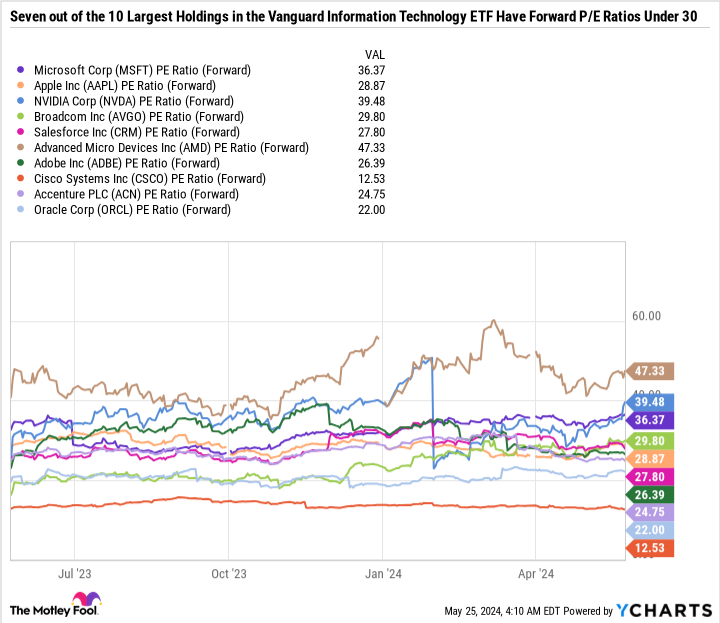Over the past three years, the S&P 500 has produced a total return (capital gains and dividends) of 32.4%, beating the Nasdaq Composite‘s 26.8% total return. Still, both indices have done well during this time period, especially considering that 2022 was the worst calendar year in the stock market since 2008.
Despite a widespread sell-off of growth stocks in 2022, Vanguard’s tech sector exchange-traded fund (ETF) has produced a total return of just over 50% in the last three years and 187.6% over the last five years. The Vanguard Information Technology ETF (NYSEMKT: VGT) includes top stocks like Microsoft, Apple, and Nvidia. And with a mere 0.10% expense ratio, or $10 in annual fees for every $10,000 invested, it’s an ultra-low-cost way to invest in the sector.
Here’s a breakdown of the fund and why it may be worth buying now.

Looking under the hood of the tech sector
Tech stocks and growth stocks are two terms that can be used seemingly interchangeably. But the industries within the tech sector have some major differences. The big three categories are semiconductors, software, and hardware.
Nvidia is a fabless chipmaker that designs its products and outsources the manufacturing to a company like Taiwan Semiconductor. There are also materials and equipment providers like ASML, which makes products needed to mass produce chips, like its extreme ultraviolet (EUV) lithography systems.
Software companies are usually categorized as infrastructure software — like Microsoft, Oracle, Adobe, Palo Alto Networks, and CrowdStrike — or application software — such as Salesforce, SAP, Intuit, ServiceNow, Uber, and Shopify.
Apple is unique because it is vertically integrated and makes its own software and hardware. But there are also computer hardware companies like Dell Technologies, Arista Networks, and HP.
Here’s a breakdown of how Vanguard defines each industry, the Vanguard Information Technology ETF’s weighting by industry, and an example holding for each category.
|
Industry |
Weighting |
Example Holding |
|---|---|---|
|
Semiconductors |
27.6% |
Nvidia |
|
Systems Software |
22.9% |
Microsoft |
|
Technology Hardware, Storage, and Peripherals |
17.3% |
Dell Technologies |
|
Application Software |
14.4% |
Salesforce |
|
Semiconductor Materials & Equipment |
4.4% |
ASML |
|
IT Consulting & Other Services |
3.6% |
Accenture |
|
Communications Equipment |
3.2% |
Cisco Systems |
|
Electronic Components and Electronic Manufacturing Components |
2.4% |
Amphenol |
|
Electronic Equipment & Instruments |
1.6% |
Garmin |
|
Other |
2.7% |
|
Data source: Vanguard.
One of the big advantages of a tech sector ETF is that it covers both the red-hot, high-margin growth stocks as well as companies that are more industrial and manufacturing in nature. The spotlight often shines on high-growth software stocks, but we rarely hear about the integral companies that are the picks and shovels of the sector.
One example is Amphenol, an $82 billion company that makes sensors, antennas, cables, fiber optic interconnections, and more. The electrical-components company is a staple of the tech sector and a holding you’ll find in the Vanguard Information Technology ETF that might otherwise be overlooked.
The sector benefits from increased technology adoption and innovation. But it all falls apart without a network of suppliers, manufacturing services, and components companies.
The pros outweigh the cons
Far and away, the biggest drawbacks of investing directly in the tech sector as opposed to a larger, more diverse growth fund are that it is the most expensive sector with a price-to-earnings (P/E) ratio of just over 40, and it excludes many tech-oriented companies like Amazon, Alphabet, and Meta Platforms which are categorized in other sectors.
The sector’s valuation is high relative to the broader market, but it’s not terrible considering the sector’s growth potential. For context, the Invesco QQQ, which tracks the performance of the 100 largest, non-financial companies in the Nasdaq Composite, has a P/E of 37.3.
Tech stocks are expensive right now because of the massive run-up in equity prices and the massive growth potential. We can expect the semiconductor and software companies to have generally higher growth rates and more expensive valuations than the hardware and components companies.
The good news is that many companies are growing quickly and are expected to continue growing at a breakneck pace. You can learn a lot about investor expectations based on forward P/E ratios, which divide the price of a stock by its forward-earnings projections over the next year instead of its trailing-12-month earnings.
As you can see in the chart, even the most scorching hot-tech stocks have somewhat reasonable forward P/E ratios. Of course, these are just estimates and should be approached with caution since forecasts rarely go as planned. But overall, the forward P/E estimates of many stocks in the tech sector make a lot of sense and indicate why the sector isn’t as overpriced as it looks at first glance.
If you don’t care too much about passive income and have a high-risk tolerance, then you might prefer to buy Apple, Adobe, or Salesforce at forward P/E ratios under 29 than Walmart with its forward P/E of 27 or Procter & Gamble with a 25.3 forward P/E. Tech isn’t the only sector that is hovering around an all-time high. The market is more expensive in general than in past years, meaning investors have to pay up for quality one way or another.
Growth is a beautiful thing
The Vanguard Information Technology ETF is the best tech-sector ETF because of its low cost, large net assets, and Vanguard’s rock-solid reputation. The fund is a particularly good choice for investors who want more exposure to the entire sector instead of just picking a handful of hot stocks.
The valuation looks pricey, but if earnings forecasts are accurate, you could argue that it’s fair or even inexpensive.
The key takeaway is that earnings growth is the single greatest catalyst for a sustained rally and can justify even the loftiest run-ups. Nvidia is a good example because its earnings growth continues to fuel its higher stock price. The fact that the stock is up 582% over the last three years but still has less than a 40-forward P/E tells you a lot about how good its earnings growth has been.
All told, tech remains a great long-term buy if you can stomach the sector’s cyclicality and approach the investment with at least a three- to five-year time horizon.
Should you invest $1,000 in Vanguard World Fund – Vanguard Information Technology ETF right now?
Before you buy stock in Vanguard World Fund – Vanguard Information Technology ETF, consider this:
The Motley Fool Stock Advisor analyst team just identified what they believe are the 10 best stocks for investors to buy now… and Vanguard World Fund – Vanguard Information Technology ETF wasn’t one of them. The 10 stocks that made the cut could produce monster returns in the coming years.
Consider when Nvidia made this list on April 15, 2005… if you invested $1,000 at the time of our recommendation, you’d have $703,539!*
Stock Advisor provides investors with an easy-to-follow blueprint for success, including guidance on building a portfolio, regular updates from analysts, and two new stock picks each month. The Stock Advisor service has more than quadrupled the return of S&P 500 since 2002*.
*Stock Advisor returns as of May 28, 2024
John Mackey, former CEO of Whole Foods Market, an Amazon subsidiary, is a member of The Motley Fool’s board of directors. Randi Zuckerberg, a former director of market development and spokeswoman for Facebook and sister to Meta Platforms CEO Mark Zuckerberg, is a member of The Motley Fool’s board of directors. Suzanne Frey, an executive at Alphabet, is a member of The Motley Fool’s board of directors. Daniel Foelber has positions in Advanced Micro Devices. The Motley Fool has positions in and recommends ASML, Accenture Plc, Adobe, Advanced Micro Devices, Alphabet, Amazon, Apple, Arista Networks, Cisco Systems, CrowdStrike, Garmin, Intuit, Meta Platforms, Microsoft, Nvidia, Oracle, Salesforce, ServiceNow, Shopify, Taiwan Semiconductor Manufacturing, Uber Technologies, and Walmart. The Motley Fool recommends Broadcom and Helmerich & Payne and recommends the following options: long January 2025 $290 calls on Accenture Plc, long January 2026 $395 calls on Microsoft, short January 2025 $310 calls on Accenture Plc, and short January 2026 $405 calls on Microsoft. The Motley Fool has a disclosure policy.
This Vanguard ETF Just Hit an All-Time High as It Continues to Outperform the S&P 500 and the Nasdaq Composite Over the Last 3 Years was originally published by The Motley Fool
Source Agencies


